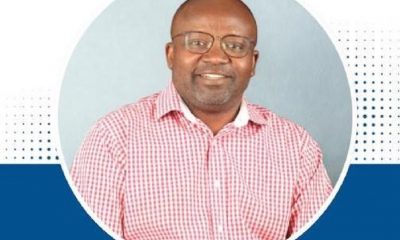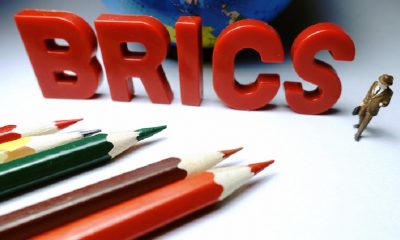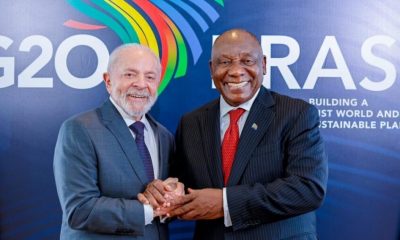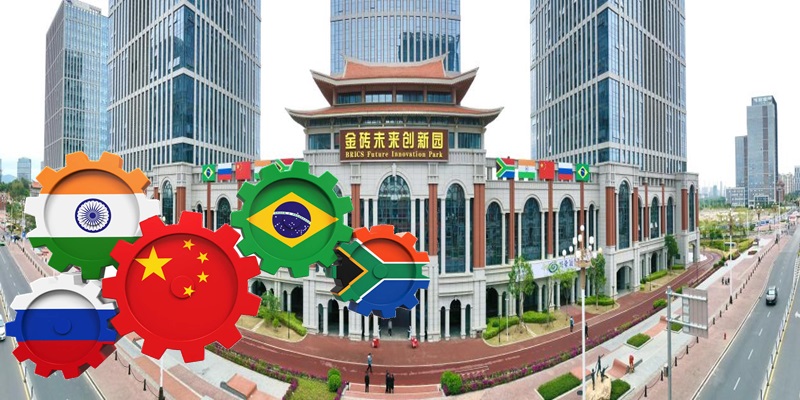Feature/OPED
Coronavirus Pandemic Worries BRICS

By Kester Kenn Klomegah
Foreign Minister Sergey Lavrov has held an extraordinary meeting of BRICS Ministers of Foreign Affairs (Brazil, Russia, India, China and South Africa) via videoconference as part of important events planned this year after Russia took over the chair-ship from Brazil.
The BRICS Foreign Affairs Ministers who took part in the meeting included Dr. Subrahmanyam Jaishankar represented India; Ernesto Araújo Foreign Affairs Minister of Brazil; Wang Yi, State Councilor and Foreign Minister of China and Ms. Grace Naledi Pandor, Minister of International Relations and Cooperation of the Republic of South Africa.
The ministers reviewed the impact of the current global crisis provoked by the outbreak of COVID-19 on the system of international relations and agreed that there is no alternative to using both bilateral and multilateral forms of cooperation, unite behind efforts without any hidden agenda, in finding a collective response to the challenges and threats posed by the coronavirus pandemic.
The meeting exchanged in-depth views on possible joint measures on how to contain COVID-19 and deal with the financial, trade, economic and social consequences of the pandemic. They discussed important issues related to developing a five-way cooperation, including the calendar of events for Russia’s BRICS Chairmanship in 2020.
“We believe that it should become a very good reinforcement for our countries’ economies when they’re coming out of the crisis stage and resume economic operations,” Lavrov noted during the meeting.
The international community should unite to ensure the most positive outcome of efforts in tackling the crisis, but acknowledged that such efforts are being undermined by sanctions imposed on some countries, and suggested that the sanctions should be lifted or removed.
In the opening speech, Lavrov emphasized the priority in dealing with the COVID-19 outbreak, protect people’s lives and health as well as the global economy. “The need to uphold multilateral principles and rely on international law in formulating solutions to current cross-border threats is an urgent challenge. We are convinced that it is very important to strengthen the solidarity of BRICS countries,” he said.
The BRICS heads of state adopted a decision a couple of years ago to expand cooperation in the fight against infections and the joint production and use of vaccines, according to Lavrov, and suggested “BRICS has to accelerate the implementation of this initiative.”
Cooperation on countering infectious diseases has long been a priority for BRICS. For instance, the final declaration of the 2015 BRICS summit in Ufa, Russia, contains instructions by the leaders to jointly work on managing the risk of disease outbreaks, including the current new coronavirus.
“We are concerned about growing and diversifying global threats posed by communicable and non-communicable diseases. They have a negative impact on economic and social development, especially in developing and in the least developed countries,” the 2015 BRICS declaration adopted in Ufa, Russia. It was the Seventh BRICS Summit, held under the theme “BRICS Partnership – a Powerful Factor of Global Development” under the chair-ship of Russia.
That declaration further stated: “In this context, we commend the efforts made by the BRICS countries to contribute to enhanced international cooperation to support the efforts of countries to achieve their health goals, including the implementation of universal and equitable access to health services, and ensure affordable, good-quality service delivery while taking into account different national circumstances, policies, priorities and capabilities.”
Chinese Foreign Minister Wang Yi echoed Sergey Lavrov’s call for unity and solidarity. In an official statement released by the ministry, Wang said that the BRICS should “stand firm by multilateralism, by the UN-centered international system” and “champion the approach of consultation and cooperation.”
“Through joint efforts, we will safeguard the legitimate rights and interests and space for development not just for ourselves but also for all other emerging market and developing countries,” Wang Yi said.
With its rapid spread in many parts of the world, COVID-19 has put lives and health of people around the world under grave threat, seriously disrupted the global economy, and posed severe challenges to BRICS, the minister said, while acknowledging further that “as representatives of major emerging countries with global influence, BRICS countries must act in the interest of the well-being of humankind, and stand by justice and equity.”
Wang Yi, however, proposed the following:
First, uphold multilateralism and improve global governance. The sudden onslaught of COVID-19 reminds again that BRICS interests are, closely entwined and the future. A challenge that respects no border and makes no distinction of ethnicity has only made global governance more important, not less, building a community with a shared future for mankind.
China’s strategic assessment is that COVID-19 will not change the theme of the times which remains peace and development; it will not cut short the historical trend toward multi-polarity and globalization, and still less will it deter humankind from its firm pursuit of civilization and progress.
In a time of crisis, BRICS must stand firm by multilateralism, by the UN-centered international system, and by the purposes and principles of the UN Charter. BRICS needs to sustain coordination in the UN, the G20 and other multilateral frameworks to keep up secure and smooth functioning of global industrial and supply chains, and defend the multilateral trading regime with the WTO as the cornerstone.
BRICS should continue to work for making development the centrepiece of the global macro policy agenda, and expedite the delivery of the 2030 Agenda for Sustainable Development.
Second, BRICS should come together in the spirit of partnership to combat COVID-19. Under the personal leadership and direction of President Xi Jinping, the Chinese government and people have fought a people’s war against COVID-19. China has acted according to the principle of shoring up confidence, strengthening unity, ensuring science-based control and taking targeted measures.
As the virus hits more countries around the world, China is doing everything it can to help those in need. In spite of substantial demand at home and growing pressures to meet foreign orders, China has provided a large amount of medical supplies to fellow BRICS countries, and facilitated the purchase of such supplies through commercial channels.
Going forward, China is ready to step up the sharing of information and experience with BRICS countries and conduct joint research and development of drugs and vaccines, respecting each other’s sovereignty and national conditions.
Third, BRICS should uphold unity and coordination to forge a powerful synergy. President Xi Jinping stated that the virus is a common enemy of humanity and can be defeated. Living in a global village, no one could stay safe when others’ houses catch fire.
Likewise, in fighting COVID-19, victory can only be secured when the virus is brought under control in all countries. China has been a strong force behind international anti-epidemic cooperation because its own experience has made it fully empathetic with other peoples suffering from similar difficulties.
As countries battle the disease in light of their own situations, China called for mutual understanding and respect for these efforts, and sharing and learning from each other’s experiences. The global community should never be distracted in its collaborative response by finger-pointing or the blame game, allow new tensions and divisions to be created as a result of politicization or stigmatization.
In view of the weaknesses and inadequacies exposed during this crisis, BRICS needs to enhance global public health governance, make it a higher priority on the international agenda, and work together to build a community of health for all.
Fourth, China will work with all BRICS members to support Russia’s Chairmanship. China also supports Russia’s initiative to formulate a Strategy for BRICS Economic Partnership 2025.
On his part, Indian Foreign Affairs Minister Dr. Subrahmanyam Jaishankar noted that BRICS, which brings together almost 42 percent of global population, with impressive growth, investment and trade share, has an important role to play in shaping the global economic and political architecture.
He highlighted the initiatives and various decisive steps taken early by India. For example, India is providing pharma assistance to nearly 85 countries, including many countries in Africa, on a grant basis, to support their response to the pandemic. This has been widely welcomed.
He further emphasized that the pandemic is not only posing a great risk to the health and well-being of humanity but is also severely impacting global economy and output by disruption of global trade and supply chains. Economic activity across sectors has been negatively impacted leading to loss of jobs and livelihoods.
He emphasized the need to provide support to businesses, especially small and medium scale enterprises, and the efficacy of traditional medicine systems to strengthen immunity be recognized and that BRICS should support these efforts.
Jaishankar emphasized the current challenge that underlines the need for reform of multilateral systems and that a reformed multilateralism was the way forward. He referred to the centrality of development and growth in the global agenda. India reaffirmed its support for Russian BRICS Chair-ship in 2020 and under the theme “BRICS Partnership for Global Stability, Shared Security and Innovative Growth.”
The BRICS member countries (Brazil, Russia, India, China and South Africa) collectively represent about 26% of the world’s geographical area and are home to 3.6 billion people, about 42% of the world’s population and with a combined nominal GDP of $16.6 trillion.
Kester Kenn Klomegah is an independent research writer, who served previously as Moscow Bureau Chief for Africa Press Agency (APA) and Inter Press Service (IPS), and has won awards including the Golden Word Prize for a series of analytical articles on Russia’s economic cooperation with African countries.
Feature/OPED
How Christians Can Stay Connected to Their Faith During This Lenten Period

It’s that time of year again, when Christians come together in fasting and prayer. Whether observing the traditional Lent or entering a focused period of reflection, it’s a chance to connect more deeply with God, and for many, this season even sets the tone for the year ahead.
Of course, staying focused isn’t always easy. Life has a way of throwing distractions your way, a nosy neighbour, a bus driver who refuses to give you your change, or that colleague testing your patience. Keeping your peace takes intention, and turning off the noise and staying on course requires an act of devotion.
Fasting is meant to create a quiet space in your life, but if that space isn’t filled with something meaningful, old habits can creep back in. Sustaining that focus requires reinforcement beyond physical gatherings, and one way to do so is to tune in to faith-based programming to remain spiritually aligned throughout the period and beyond.
On GOtv, Christian channels such as Dove TV channel 113, Faith TV and Trace Gospel provide sermons, worship experiences and teachings that echo what is being practised in churches across the country.
From intentional conversations on Faith TV on GOtv channel 110 to true worship on Trace Gospel on channel 47, these channels provide nurturing content rooted in biblical teaching, worship, and life application. Viewers are met with inspiring sermons, reflections on scripture, and worship sessions that help form a rhythm of devotion. During fasting periods, this kind of consistent spiritual input becomes a source of encouragement, helping believers stay anchored in prayer and mindful of God’s presence throughout their daily routines.
To catch all these channels and more, simply subscribe, upgrade, or reconnect by downloading the MyGOtv App or dialling *288#. You can also stream anytime with the GOtv Stream App.
Plus, with the We Got You offer, available until 28th February 2026, subscribers automatically upgrade to the next package at no extra cost, giving you access to more channels this season.
Feature/OPED
Turning Stolen Hardware into a Data Dead-End

By Apu Pavithran
In Johannesburg, the “city of gold,” the most valuable resource being mined isn’t underground; it’s in the pockets of your employees.
With an average of 189 cellphones reported stolen daily in South Africa, Gauteng province has become the hub of a growing enterprise risk landscape.
For IT leaders across the continent, a “lost phone” is rarely a matter of a misplaced device. It is frequently the result of a coordinated “snatch and grab,” where the hardware is incidental, and corporate data is the true objective.
Industry reports show that 68% of company-owned device breaches stem from lost or stolen hardware. In this context, treating mobile security as a “nice-to-have” insurance policy is no longer an option. It must function as an operational control designed for inevitability.
In the City of Gold, Data Is the Real Prize
When a fintech agent’s device vanishes, the $300 handset cost is a rounding error. The real exposure lies in what that device represents: authorised access to enterprise systems, financial tools, customer data, and internal networks.
Attackers typically pursue one of two outcomes: a quick wipe for resale on the secondary market or, far more dangerously, a deep dive into corporate apps to extract liquid assets or sellable data.
Clearly, many organisations operate under the dangerous assumption that default manufacturer security is sufficient. In reality, a PIN or fingerprint is a flimsy barrier if a device is misconfigured or snatched while unlocked. Once an attacker gets in, they aren’t just holding a phone; they are holding the keys to copy data, reset passwords, or even access admin tools.
The risk intensifies when identity-verification systems are tied directly to the compromised device. Multi-Factor Authentication (MFA), widely regarded as a gold standard, can become a vulnerability if the authentication factor and the primary access point reside on the same compromised device. In such cases, the attacker may not just have a phone; they now have a valid digital identity.
The exposure does not end at authentication. It expands with the structure of the modern workforce.
65% of African SMEs and startups now operate distributed teams. The Bring Your Own Device (BYOD) culture has left many IT departments blind to the health of their fleet, as personal devices may be outdated or jailbroken without any easy way to know.
Device theft is not new in Africa. High-profile incidents, including stolen government hardware, reinforce a simple truth: physical loss is inevitable. The real measure of resilience is whether that loss has any residual value. You may not stop the theft. But you can eliminate the reward.
Theft Is Inevitable, Exposure is Not
If theft cannot always be prevented, systems must be designed so that stolen devices yield nothing of consequence. This shift requires structured, automated controls designed to contain risk the moment loss occurs.
Develop an Incident Response Plan (IRP)
The moment a device is reported missing, predefined actions should trigger automatically: access revocation, session termination, credential reset and remote lock or wipe.
However, such technical playbooks are only as fast as the people who trigger them. Employees must be trained as the first line of defence —not just in the use of strong PINs and biometrics, but in the critical culture of immediate reporting. In high-risk environments, containment windows are measured in minutes, not hours.
Audit and Monitor the Fleet Regularly
Control begins with visibility. Without a continuous, comprehensive audit, IT teams are left responding to incidents after damage has occurred.
Opting for tools like Endpoint Detection and Response (EDR) allows IT teams to spot subtle, suspicious activities or unusual access attempts that signal a compromised device.
Review Device Security Policies
Security controls must be enforced at the management layer, not left to user discretion. Encryption, patch updates and screen-lock policies should be mandatory across corporate devices.
In BYOD environments, ownership-aware policies are essential. Corporate data must remain governed by enterprise controls regardless of device ownership.
Decouple Identity from the Device
Legacy SMS-based authentication models introduce avoidable risk when the authentication channel resides on the compromised handset. Stronger identity models, including hardware tokens, reduce this dependency.
At the same time, native anti-theft features introduced by Apple and Google, such as behavioural theft detection and enforced security delays, add valuable defensive layers. These controls should be embedded into enterprise baselines rather than treated as optional enhancements.
When Stolen Hardware Becomes Worthless
With POPIA penalties now reaching up to R10 million or a decade of imprisonment for serious data loss offences, the Information Regulator has made one thing clear: liability is strict, and the financial fallout is absolute. Yet, a PwC survey reveals a staggering gap: only 28% of South African organisations are prioritising proactive security over reactive firefighting.
At the same time, the continent is battling a massive cybersecurity skills shortage. Enterprises simply do not have the boots on the ground to manually patch every vulnerability or chase every “lost” terminal. In this climate, the only viable path is to automate the defence of your data.
Modern mobile device management (MDM) platforms provide this automation layer.
In field operations, “where” is the first indicator of “what.” If a tablet assigned to a Cape Town district suddenly pings on a highway heading out of the city, you don’t need a notification an hour later—you need an immediate response. An effective MDM system offers geofencing capabilities, automatically triggering a remote lock when devices breach predefined zones.
On Supervised iOS and Android Enterprise devices, enforced Factory Reset Protection (FRP) ensures that even after a forced wipe, the device cannot be reactivated without organisational credentials, eliminating resale value.
For BYOD environments, we cannot ignore the fear that corporate oversight equates to a digital invasion of personal lives. However, containerization through managed Work Profiles creates a secure boundary between corporate and personal data. This enables selective wipe capabilities, removing enterprise assets without intruding on personal privacy.
When integrated with identity providers, device posture and user identity can be evaluated together through multi-condition compliance rules. Access can then be granted, restricted, or revoked based on real-time risk signals.
Platforms built around unified endpoint management and identity integration enable this model of control. At Hexnode, this convergence of device governance and identity enforcement forms the foundation of a proactive security mandate. It transforms mobile fleets from distributed risk points into centrally controlled assets.
In high-risk environments, security cannot be passive. The goal is not recovery. It is irrelevant, ensuring that once a device leaves authorised hands, it holds no data, no identity leverage, and no operational value.
Apu Pavithran is the CEO and founder of Hexnode
Feature/OPED
Daniel Koussou Highlights Self-Awareness as Key to Business Success

By Adedapo Adesanya
At a time when young entrepreneurs are reshaping global industries—including the traditionally capital-intensive oil and gas sector—Ambassador Daniel Koussou has emerged as a compelling example of how resilience, strategic foresight, and disciplined execution can transform modest beginnings into a thriving business conglomerate.
Koussou, who is the chairman of the Nigeria Chapter of the International Human Rights Observatory-Africa (IHRO-Africa), currently heads the Committee on Economic Diplomacy, Trade and Investment for the forum’s Nigeria chapter. He is one of the young entrepreneurs instilling a culture of nation-building and leadership dynamics that are key to the nation’s transformation in the new millennium.
The entrepreneurial landscape in Nigeria is rapidly evolving, with leaders like Koussou paving the way for innovation and growth, and changing the face of the global business climate. Being enthusiastic about entrepreneurship, Koussou notes that “the best thing that can happen to any entrepreneur is to start chasing their dreams as early as possible. One of the first things I realised in life is self-awareness. If you want to connect the dots, you must start early and know your purpose.”
Successful business people are passionate about their business and stubbornly driven to succeed. Koussou stresses the importance of persistence and resilience. He says he realised early that he had a ‘calling’ and pursued it with all his strength, “working long weekends and into the night, giving up all but necessary expenditures, and pressing on through severe setbacks.”
However, he clarifies that what accounted for an early success is not just tenacity but also the ability to adapt, to recognise and respond to rapidly changing markets and unexpected events.
Ambassador Koussou is the CEO of Dau-O GIK Oil and Gas Limited, an indigenous oil and natural gas company with a global outlook, delivering solutions that power industries, strengthen communities, and fuel progress. The firm’s operations span exploration, production, refining, and distribution.
Recognising the value of strategic alliances, Koussou partners with business like-minds, a move that significantly bolsters Dau-O GIK’s credibility and capacity in the oil industry. This partnership exemplifies the importance of building strong networks and collaborations.
The astute businessman, who was recently nominated by the African Union’s Agenda 2063 as AU Special Envoy on Oil and Gas (Continental), admonishes young entrepreneurs to be disciplined and firm in their decision-making, a quality he attributed to his success as a player in the oil and gas sector. By embracing opportunities, building strong partnerships, and maintaining a commitment to excellence, Koussou has not only achieved personal success but has also set a benchmark for future generations of African entrepreneurs.
His journey serves as a powerful reminder that with determination and vision, success is within reach.
-

 Feature/OPED6 years ago
Feature/OPED6 years agoDavos was Different this year
-
Travel/Tourism10 years ago
Lagos Seals Western Lodge Hotel In Ikorodu
-

 Showbiz3 years ago
Showbiz3 years agoEstranged Lover Releases Videos of Empress Njamah Bathing
-

 Banking8 years ago
Banking8 years agoSort Codes of GTBank Branches in Nigeria
-

 Economy3 years ago
Economy3 years agoSubsidy Removal: CNG at N130 Per Litre Cheaper Than Petrol—IPMAN
-

 Banking3 years ago
Banking3 years agoSort Codes of UBA Branches in Nigeria
-

 Banking3 years ago
Banking3 years agoFirst Bank Announces Planned Downtime
-

 Sports3 years ago
Sports3 years agoHighest Paid Nigerian Footballer – How Much Do Nigerian Footballers Earn




















